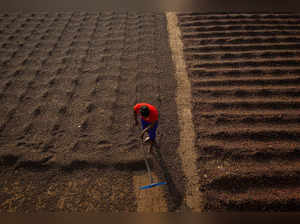Synopsis
India’s robusta coffee prices skyrocket to Rs 10,080 per 50 kg, a historic high. Growers face challenges, but the surge brings relief. Supply-demand dynamics and shifts in production contribute to this windfall, offering hope for the industry.

India’s coffee industry is witnessing a windfall as robusta coffee bean prices skyrocketed to an unprecedented Rs 10,080 per 50 kg bag as of Friday. This surge marks a historic high since the establishment of coffee estates in the Western Ghats region during the 1860s by the British.
Unlike the relatively stable pricing of Arabica coffee, known for its creamy layer in a shot, robusta prices have typically ranged between Rs 2,500 to Rs 3,500 per 50 kg bag for nearly 15 years.
The surge in robusta coffee prices has brought relief and joy to coffee growers, especially those with smaller holdings who primarily cultivate robusta due to its lower input costs compared to Arabica. These growers have faced challenges such as erratic rainfall, crop damage by wild animals, and rising input and labor costs over the past decade.
G Nithin, a coffee planter in Chikkamagaluru, expressed his delight, telling TOI, “I never imagined, even in my wildest dreams, that prices would reach the Rs 10,000-mark.” Nithin had already sold a portion of his stock in anticipation of further price increases.
According to Nanda Belliappa, chairman of the Codagu Planters Association, the surge in robusta coffee prices can be attributed to the basic principles of supply and demand. Factors such as decreased coffee production in major robusta-producing countries due to adverse weather conditions and changes in cropping patterns have contributed to this windfall for Indian growers.
Sources within the Coffee Board of India also attribute the price surge to major robusta coffee growers like Vietnam and Indonesia shifting to more profitable crops such as dragon fruits and avocados. Additionally, there is an increasing demand for coffee in the cosmetics industry.
In India, Karnataka, Kerala, and Tamil Nadu collectively contribute to 83% of coffee production, with Karnataka alone accounting for 70% of the total output. However, coffee plantations in Karnataka have faced challenges in recent years, with many farmers selling their land to real estate developers or converting it into tourism ventures due to diminishing returns and labor shortages.
Somaiah, a coffee farmer, told TOI, “There is a severe scarcity of skilled workers to tend to the estates, coupled with a steep increase in labor costs.” Planters have increasingly relied on migrant laborers from Bengal and Assam, who bring experience from working in tea estates.
Moreover, wildlife encroachment poses a significant threat to coffee plantations, with elephants, bisons, monkeys, and giant squirrels damaging crops in search of food and water.
Despite these challenges, the surge in robusta coffee prices offers a glimmer of hope for Indian coffee growers, signaling a potential turnaround for the industry after years of struggle.
source: http://www.economictimes.indiatimes.com / The Economic Times / Home> News> Business News> News> Economy / by ET Online / April 13th, 2024

